Battle of Paris 200 years ago, Russian troops entered Paris
Napoleon wanted to continue fighting, believing that the chances of success were still there. However, under pressure from his own marshals, taking into account the mood of the population and the balance of power, he was forced to concede. On April 4, Emperor Napoleon wrote a letter of renunciation in favor of his son Napoleon II. Regent was supposed to be his wife Maria Louise. 6 April, when part of the French army went over to the side of the Allies, Napoleon wrote an act of abdication for himself and his heirs. The Senate proclaimed king Louis XVIII. The French Empire collapsed. Napoleon was sent to the honorary exile on Elba Island in the Mediterranean.
Prehistory The ratio of forces
March 24 Allied Command approved a plan for an attack on Paris. 25 March Allied forces near Fer-Champenoise crushed the corps of Marshals Marmont and Mortier. At the same time, the divisions of the National Guard under the command of General Pakto were destroyed. March 29 Allied armies (about 100 thousand soldiers, of which 63 thousand Russian) came close to the front line of defense. They moved from the north-east in three columns: Field Marshal Blucher (Russian-Prussian troops from the Silesian Army) led the right; the central was headed by a Russian general, Barclay de Tolly; the left column was commanded by the crown prince of Württemberg, she was advancing along the right bank of the Seine. The overall command in the center and on the left flank of the Allies was entrusted to the commander-in-chief of the Russian-Prussian troops in the Main Army Barclay de Tolly. The main army was to attack Romenvilskoe plateau, and the Silesian - Montmartre. Wrede commanded the Austro-Bavarian troops, who covered the main forces from the rear.
Napoleon at this time planned to go to the rear of the Allied armies, threatening to cut off their communications. By this he hoped to distract the Allied forces from Paris. In addition, he wanted to go to the northeastern fortresses on the border of France and, by attaching their garrisons, strengthen their army. 27 March Napoleon found out about the Allied attack on Paris and March 28 left Saint-Dizier (about 180 km east of Paris) to save the capital, but was late.
The French capital was the largest city in Western Europe with a population of more than 700 thousand people. Most of the city was located on the right bank of the Seine. From three directions, the city was defended by the bends of the Seine and its right tributary of the Marne. In the northeastern direction from the Seine to the Marne, there was a chain of hills (of which Montmartre was the most serious). From the north-east, the Urk Canal passed through, which flowed into the Seine in the city itself. The defensive line of the capital ran along partially fortified heights: from Montmartre on the left flank through the villages of Lačapelle, Lavilet and Panten in the center and to Romainville on the right flank. The distance from the advanced fortifications to the center of Paris was about 5-10 km.
On the left wing from the Seine to the Urk Canal (including Montmartre and Lavilet) were troops under the command of Marshals Mortier and Monsey (Chief of Staff of the National Guard). The right flank of the canal to the Marne, including Panten and Romainville, was defended by Marmont’s troops. Formally, Joseph Bonaparte, viceroy of the emperor in Paris, was considered the commander in chief. According to various sources, the capital was defended by 28-45 thousand people, including about 6-12 thousand militia of the National Guard. French troops had about 150 guns.
In general, the mood in Paris was gloomy. Among the ministers there were actually no determined and strong people capable of leading the defense of the city in the absence of Napoleon. Talleyrand was on the side of Napoleon’s opponents. King Joseph was personally a brave man, but did not have the abilities that could strengthen the defense of Paris in such extraordinary circumstances. He had long been desperate to protect the capital. The arrival of the broken corps of Marmont and Mortier further demoralized the command. The city was fortified poorly and was not ready for a long siege, only at the outposts there were palisades. There were no guns to arm tens of thousands of Parisians. In addition, there was no man who, in the absence of Napoleon, took upon himself the responsibility to arm the common people.
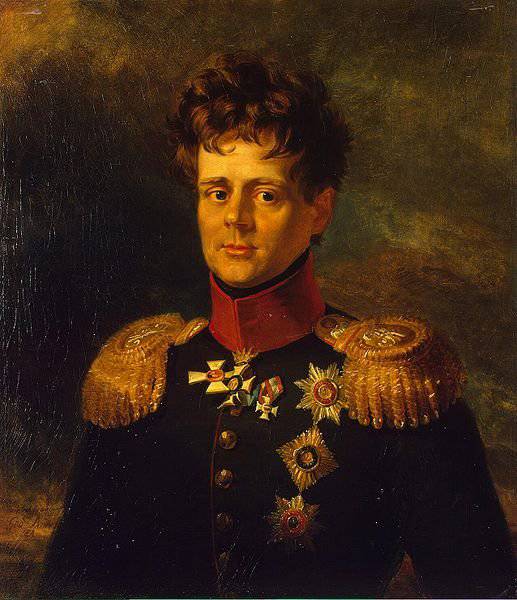
Evgeny Württemberg
Bits
The allied command wanted to take the city before the approach of Napoleon’s army, which would seriously complicate the situation. Therefore, the storm went to the concentration of all forces. At 6 on the morning of March 30 the attack on Paris began. Gnfreich's 14 Division from the Württemberg corps attacked the village of Panten in order to outrun the French troops, which began to move into position. General Rajewski with the 1 Infantry Corps went to storm the heights of Romainville. At the same time, the Russian emperor suggested that the French capitulate in order to "prevent the calamity of Paris." According to Alexander, “by will or captivity, on bayonets or a ceremonial march, on ruins or in palaces, but today Europe should spend the night in Paris.” However, the Russian parliamentarians attacked, and they barely survived.
Panten changed hands several times, but in the end he was occupied by Russian troops. As a result, the Russian troops outstripped the French troops that were advancing to the position and occupied the villages of Panten and Romainville. If the army of Blucher also had time to launch an offensive earlier than the French took the leading positions, the battle could immediately take on a disastrous scenario for the French.
Marmont built troops, launched a counterattack. The troops under the command of the crown prince of Württemberg (the future king of Württemberg) did not have time to start the battle, which allowed Marmont to concentrate all forces against the corps of Prince Eugene and Rayevsky. Russian troops attacked the division of General Kompan, supported by the divisions of Ledru and Lagrange (only about 5 thousand soldiers). The fierce battle lasted about two hours and cost the Russian troops up to 1,5 thousand people. Yevgeny Württemberg, who commanded the Russian 2 Infantry Corps, requested reinforcements from Barclay de Tolly. The Russian commander-in-chief dispatched two divisions of the 3 Grenadier Corps. At the same time, he sent the Prussian-Baden Guards Brigade to Panten, and brought the Russian Guard closer to the battlefield, she stood at Noisy-le-Sec.
During the battle of the corps of the Württemberg corps with the French, the 5-division of Mezentsev went to Bagnolet, and the Vlastov brigade reinforced the 2-corps from the left flank. Light cavalry Palen headed to the village of Montreul and to the left of it, bypassing the French positions. At the same time, the Russian emperor ordered Langeron to attack Montmartre.
The fight was fierce. The French were able to create local superiority in numbers -. Marmont thrown in more than 12 thousand soldiers in his romenvilskom plateau opposed only 8,2 thousand soldiers of Prince Eugene of Württemberg and Rajewski (3-I Prince Shahovskoy division, brigade Vlastov, 5-Division Mezentsev and. light cavalry Palen). Marmont tried to knock the Russians out of the forest from Romainval and take this village. The French were able to occupy the forest. But then came under attack from the front and rear. At about 11 in the morning hours, 4 and 34, the chasseurs of the regiments under the command of Colonel Stepanov and Lieutenant Colonel Rusinov, bypassed the enemy from the left flank and hit the French flank. At the same time, the battalion of the Volynsky regiment (about 400 soldiers) hit the rear of the French. Volyntsy fell almost all. The losses of the parties were very significant, dropping out one chain after another. Stepanov and Rusinov fell the lives of the brave ahead of their soldiers. However, the problem was solved. The French division of Ledru suffered heavy losses and cleared the Romainville forest.
Persistent battle boiled and Urk Canal, near the village of Panten. The divisions of Michel and Boje occupied part of the village of Panten. General Kretov with several squadrons of cuirassiers went to the counterattack. But the terrain was inconvenient to attack cavalry, so the French arrows easily repulsed this offensive. Gnfreich's 14 Division, especially the huntsman, also suffered heavy losses. The brigade commander, Major General Roth, and all the staff officers of the 26 Regiment were injured.
At noon, reinforcements sent by Barclay de Tolly arrived. Prussian-Baden Guard Colonel Alvensleben (3,6 thousand people) moved to Paten; 1-I Grenadier Division Choglokova (4,5 thousand. People) to Romainville; 2-I Grenadier Division Paskevich (4,5 thousand soldiers) to Montreuil. Allied forces go on the offensive - go to Pre-Saint-Gervais, Belleville, capture Montreles. At one o'clock in the afternoon Pyshnitsky's division attacked the village of Pre-Saint-Gervais, several guns were beaten off from the French. The French retreated to Belleville, where they could count on the support of strong artillery batteries. Soon, however, Prince Eugene received an order from Barclay de Tolly to temper the ardor before the advent of the troops of Crown Prince of Württemberg, who were moving along the right bank of the Seine. For two hours the battle was limited to a shootout.
Only Panten, who was occupied by the remnants of Gelfreich's division, had a fierce new battle. In the first hour, the Alvensleben Brigade approached and selected Prussian troops, who had not fought during the 1814 Campaign of the Year, decided to attack. Prince Eugene, tried to dissuade them from this venture. However, the Prussians did not obey. The French had a Secretan brigade and the Curial division (about 4 thousand people). Four French guns were put on the road and could fire at the exit from Panten. Two more batteries were located at the height of Saint-Gervais and at the Ursky Canal. This allowed the French gunners to crossfire along the road.
Lieutenant Colonel Block with two battalions attacked the French. The advanced French forces were overthrown. However, then the Prussian troops ran into a powerful rifle-artillery fire. Rack shots just mowed down the soldiers. The lieutenant colonel himself was wounded, wounded, or the other officers, many soldiers, were killed. Colonel Alvensleben brought the rest of the brigade into battle. Prussian-Baden Guards attacked in three columns, but only suffered heavy losses. The place was very successful for the defenders. The Prussians were forced to go on the defensive.
The onset of the army of Blucher. The army of Blucher was able to launch an offensive only in the 11 hours, when the Russian troops had been fighting fiercely for several hours. The Russian corps of Langeron (about 17 thousand people) was to attack Montmartre, leaving some of the forces for the blockade of Saint-Denis. The Prussian corps of York and Kleist (18 thousand people) were given the task of occupying the villages of Lavilette and LaChapelle (La Villette and La Chapelle). The infantry corps of Wintzingerode (12 thousand people) under the command of Count Vorontsov was in reserve.
The Langeron Corps was located closest to the city, in the Le Bourget district. As soon as Langeron heard an artillery battle near Panten, he, without waiting for an order, led the troops to Paris. In 10 hours, the avant-garde commander, General Emmanuel, began a battle for Oberwil, who defended Robert's brigade (2, thousand soldiers). At one o'clock in the afternoon, Robert's team was knocked out and retreated to Lachapelle. Count Langeron sent 1 and 9 infantry corps under Kaptsevich to Saint-Denis. He, finding that the fortified city could not be taken on the move, left three regiments under Saint-Denis under the command of Kornilov. The French garrison began a battle with the detachment of Kornilov, which lasted until the evening. The Prussian corps began moving into the Grand Drancy (Drancy) 10 watch. They were moving slowly, so the Russian troops had to move "turtle step" and several times to stop, waiting for neighbors.
During the battle, the headquarters of King Joseph (Joseph) Bonaparte was in Montmartre. From this dominant height one could see the whole battlefield. The formal commander of the French defense was able to convince himself that the main forces of the Allied armies were standing against Paris, under the personal command of the monarchs. King Joseph convened a meeting to decide on the withdrawal of troops. During it, Marmon reported that it was impossible to continue the battle for more than a few hours and save the capital from disasters that could accompany the battle in the city itself. At the same time, the Silesian Army completed its deployment. Fearing that the Allies would cut the path to retreat, and he will be captured, the former king of Spain, suddenly decided to leave Paris. He also ordered to go to Blois, where the Empress and her son, all the ministers and the chief dignitaries had already left. Marshals Marmont and Mortier received all the authority to negotiate with the Allied command and the retreat from Paris. Thus, the army headquarters “evaporated”.
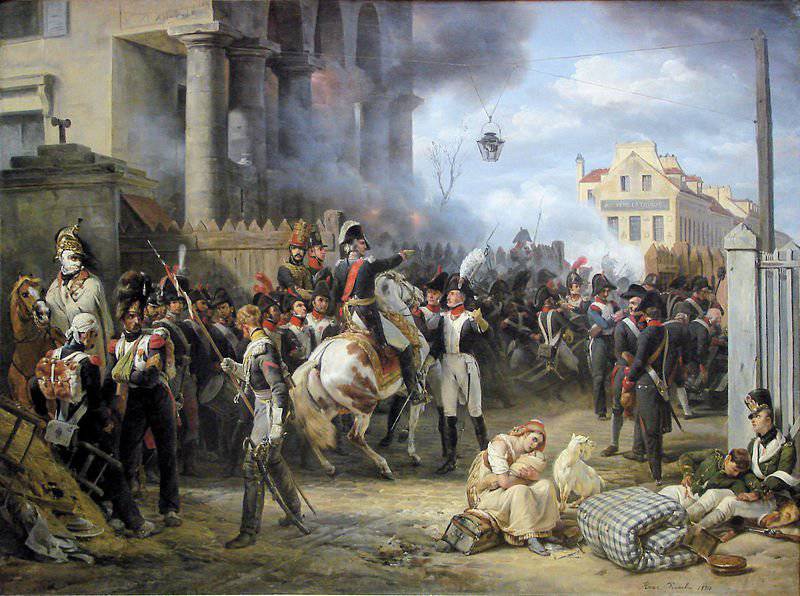
Defense of Clichy Outpost in Paris in 1814. Painting by O. Vernet
The offensive corps of the crown prince of Württemberg. At about 3 hours of the day the crown prince of Württemberg approached the capital. The Crown Prince's troops pushed aside a small detachment of the enemy from Nogent. Then the troops moved in two columns. The right column moved along the road through the forest to Vincennes, and the left - to Saint-Moru. The commander of the right column, General Stockmayer, took a blockage that defended a small detachment of regular troops and the National Guard and sent one battalion to observe the Vincennes Castle. The remaining forces sent to the aid of the left column. The left column, under the command of Prince Hohenlohe, quite easily captured Saint-Maur, who was defended by 400 recruits with 8 guns. The French were scattered, their guns captured. The remnants of the French detachment with one gun retreated to Charenton.
Then the crown prince of Württemberg sent part of the forces to impose a lock on Vincennes, and the rest of the forces were sent to Charenton. The village defended up to 500 people with 8 guns. Allied artillery suppressed French guns, and Prince Hohenlohe with two Württemberg battalions knocked down the enemy to the bridge. Austrian grenadiers attached to the Württemberg corps seized 5 guns and did not let the bridge blow to the other side of the Marne. The French were knocked out of the bridgehead and captured more 3 guns.
The crown prince sent a detachment to the right bank of the Marne; he had to follow the other bank before the river merged with the Seine. Giulaya's Austrian corps, which followed the Württemberg corps, arrived at the battle site only around 4 hours. When the outcome of the battle for Paris was already decided by Russian troops in the center of the enemy position. Therefore, the entire participation of the Austrian army in the capture of Paris was limited to the imposition of the Castle of Vincennes, together with the Württemberg troops.
Battle plan for Paris in 1814
The continuation of the offensive Barclay de Tolly. Up to three hours in the area of Romainville there was an operational pause. Opponents were firing, regrouping forces upset by the battle. Tightening reinforcements. At three o'clock, when the Silesian army had already stormed the positions of the Mortier forces, and on the left flank the Württemberg troops were brought up, Barclay de Tolly decided to continue the offensive in the center. General Lambert received an order with the grenadier corps to support the troops fighting on the Romenvilsky plateau, and General Yermolov with the Life Grenadier and Pavlovsky regiment moved to Panten. Behind them was the rest of the guard under the command of Miloradovich.
The 5 division of Mezentsev, commanded by Rajewski and Prince Gorchakov, dismantled the Arrigi division from Banjole. The French retreated to Sharonn. Marmont, fearing that the Arrigi division would be cut off from the rest of the forces, ordered her to move to the left. Prince Gorchakov occupied Sharonn. Russian troops reached the Fontarabia outpost, which was protected by the National Guard battalion with 4 guns. At the same time, part of the cavalry of Palen came to Vincennes and a sudden attack seized 25 guns from the artillery column (28 guns), which was coming from the Throne Outpost. Weak gun cover was killed or captured. However, all the guns could not be held. To the rescue of the guns came Colonel Ordener with the 30 th Dragoon regiment and a strong detachment of the National Guard. Palen could not throw into the battle all the forces, and retreated, taking 9 guns.
Other Russian troops were advancing. Xnumx-division Pyshnitsky, with the support of the grenadier Choglokova and cuirassier Stahl attacked Pre-Saint-Gervais. Division Kompana was overturned. As a result of all of Marmon's troops, only the small division of Ricard remained in the columns of the Briards Park, the rest of the troops were upset and scattered with rifle chains. Marmont, trying to stop the offensive of the Russian troops, tried to counterattack with one of the brigades of the Ricard division. However, when his troops left the park, they were upset by shot fire. Under the marshal killed a horse. General Pelleport was injured. Cuirassier attack completed the rout. General Clavel and before the infantry battalion were captured. Marshal Marmona was saved by the courage of Colonel Genezer. He with 4 soldiers left the park and delivered a sudden blow to the Russian troops. This saved the marshal, he took the remnants of the troops to Belleville.
At the last French position at Belleville, Marmont had about 5 thousand soldiers left. It should be noted that the French cavalry in the course of this battle on the right flank was practically inactive. The terrain was rugged with plenty of forests and parks. Apparently, in the valley of Saint-Denis, the French cavalry could be used with great success.
Barclay de Tolly, after capturing the Briards Park, prepared the final decisive blow, which was to bring down the remaining French troops and leave directly to the city. The division of Mezentsev, despite the strong artillery fire of the enemy, broke into the village of Menilmontan. Paskevich's grenadiers launched an offensive from Fargeot Park and captured 7 guns. The French cavalry was forced into the city. Count Palen discarded the French who occupied Small Sharonn. Prince Eugene of Württemberg with Shakhovsky's division and Vlastov's brigade occupied the Mont-Louis cemetery and captured the 8 guns that were located there.
The French division of Boye, which defended Pre-Saint-Gervais, began to retreat. She was attacked from the front and rear. The attack of the Polish lancers allowed the French to retreat to Belleville. However, 17 guns got the 4 division. Russian troops came to Belleville and began to bypass the flanks of Marmont. Ermolov installed the battery and began to smash the Parisian quarters. Marmont, seeing that he was surrounded, gathered the remaining troops and, in the head of the shock column, together with the generals Ricard, Buden and Maynadier set off for a breakthrough. Ricard was wounded, the clothes of the marshal in several places penetrated the bullets, but he survived. The French were able to break through the chain of shooters and retreated to the plateau behind Belleville. The Russians at the heights directly installed the batteries near the city and hit the nearest suburbs with grenades. The Prussian-Baden Brigade Alvensleben also successfully advanced. The Prussians seized 10 guns and reached the Panten Outpost. It was a difficult day for the brigade, she lost up to half of the personnel.
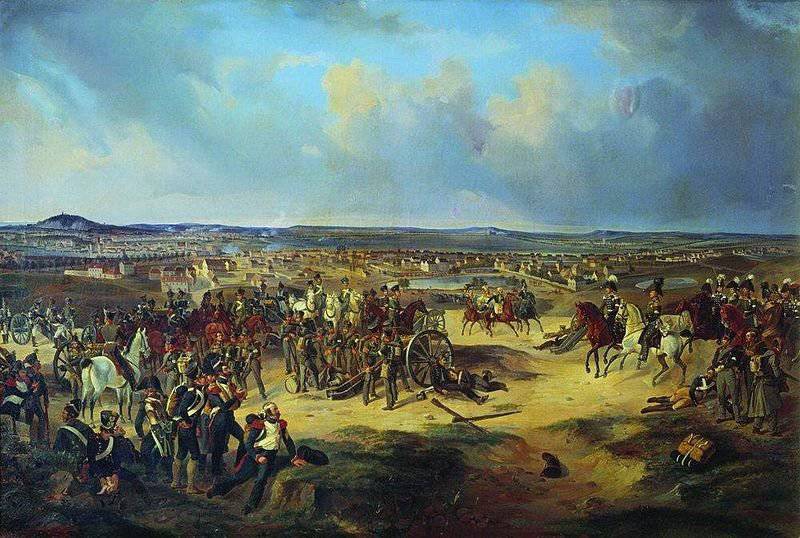
Battle of Paris in 1814 Hood. B. Villevalde (1834)
The actions of the army Blucher. On the left flank, the position of the French was also hopeless. Blucher sent part of the forces of his left flank to assist the Russian troops at Panten. Initially, they came under heavy artillery fire, and stopped, but then broke the resistance of the enemy. The Prussians defeated part of the Boye division, capturing 5 guns.
Mortier occupied Lavillette with the division of Curial (1,8 thousand soldiers), and Lachapel with the division of Charpentier (1,5 thousand people). The Prussian Hussars knocked over the French dragoons, seizing 14 guns. At 4, the Russian 13 and 14 jäger regiments broke into Lavilette. They were supported by the 1-th Bug Cossack Regiment and other units. On the Urk Canal side, soldiers from the Brandenburg Reserve Regiment and the 14 Silesian Landwehr Regiment broke into the village. The French were knocked out of Laville. General Christiani counterattacked, trying to recapture Lavillette, but the Prussian Guard arrows, who forced the channel, hit him in the rear. Christians retreated to the outpost, but beat off the 4 guns.
Horn's division, and behind it, Kleist's corps captured Lachapelle. Troops Charpentier and Robert retreated into the city. The French cavalry also retreated to the city. The troops of Langeron attacked Montmartre, which was defended by the motley troops of different legions of the National Guard, conscripts recruits, disabled people, etc. The height was covered by 30 guns. The French still held the dominant heights, but the fate of the battle was decided in this direction.
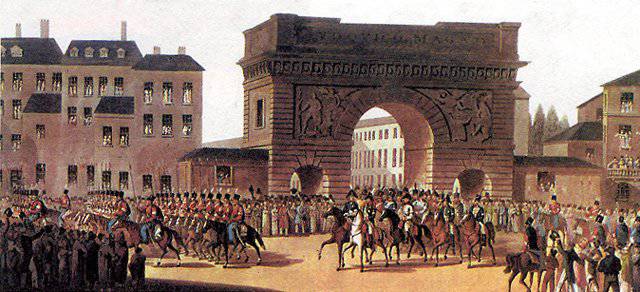
Russian army enters Paris
Talks
At 4 hours, Marmont told Mortier about the state of affairs on the right flank and asked to report on the situation on the left flank. He also announced that he intends to begin negotiations. Mortier, who was not reached by the King’s envoy, said that it was necessary to get permission from King Joseph. However, that was not a few hours. Marmont, knowing about the king's departure and having the authority to open negotiations, sent parliamentarians with a proposal for an armistice.
General Langrange reached the Allied monarchs. Emperor Alexander I gave the following answer: "He will order to stop the battle if Paris is surrendered: otherwise, in the evening they will not know the place where the capital was." Alexander refused to stop the offensive, but sent his aide-de-camp, Colonel Orlov, to Marmont. The Russian envoy informed the marshal that the Russian emperor wanted to save Paris for France and the whole world. French troops had to retreat beyond the gates. And the command to form a commission for the surrender of Paris.
At about 5 hours the fire stopped all along the line of the Main Army, the Silesian Army continued its offensive. On the Allied side, the talks were led by Count Nesselrode, Colonel Orlov, Schwatzenberg’s adjutant, Count Parr.
At this time, the troops of Lanzheron - 8 corps of Rudziewicz, 10 corps of Kaptsevich, attacked the heights of Montmartre. As Langeron wrote: “the fearlessness, order and speed of the columns attacking Montmartre is beyond all praise, and in the continuation of 19 campaigns made by him, he didn’t see anything like that except for Ismail’s assault ...” The French managed to make only two shots before the lower battery was captured. The top battery made a volley of all the guns, but also did not hold out. The French cavalry tried to counterattack, but was discarded. Within a few minutes 29 guns were captured, 60 charging vehicles and 150 people were captured, the rest of the French died or fled into the city.
After the capture of Montmartre Lanzheron received the order of Alexander to stop the fighting. The joyful news of the closeness of the surrender of Paris spread through the troops. Lanzheron also sent out guards at the city outposts, placed the troops on the heights and installed 84 guns on them, directing them to the city blocks. Rudziewicz for the storming of Montmartre was awarded the Order of St. George of the 2 class, and Langeron was awarded the Order of St. Andrew the First Called.
2 o'clock in the morning 31 March in the village of Lovelet was signed by the surrender of Paris. By morning, the French army was supposed to leave the capital. At noon 31 March 1814, units of the Allied army, mainly Russian and Prussian guards, led by Emperor Alexander I triumphantly entered the French capital. The last time the enemy troops were in Paris in the XV century during the Hundred Years War.
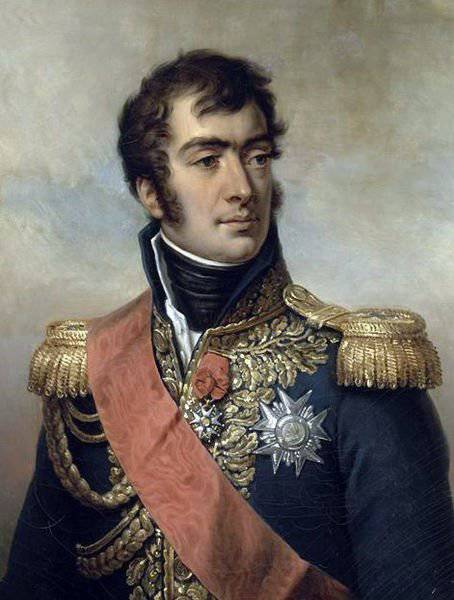
Auguste Frederic Louis Vieiss de Marmont
Results
The battle for Paris was one of the bloodiest in the 1814 campaign of the year: Allied forces lost more than 8 thousand people. Of these, more than 6 thousand people were Russian, more than 2 thousand people - Prussians. The Württemberg corps lost about 180 people. According to others, the Allies lost more than 9 thousand people. Exact French losses unknown. Sources have reported 4 thousand people. The Allies captured 114 guns, of which 70 was captured by Russian soldiers. Barclay de Tolly was granted to field marshals, Prince Eugene of Württemberg - to generals from infantry. Blucher received a princely dignity, General York received the title of Count of Wartenburg, etc.
The battle for Paris led to the downfall of Napoleon’s empire. March 25 (April 6) in Fontainebleau, the French emperor, under pressure from his marshals, abdicated the throne. He was exiled to the island of Elba on the Italian coast. The French throne passed the Bourbon dynasty. 30 May 1814 between the participants of the sixth anti-French coalition (Russia, England, Austria and Prussia), on the one hand, and France, on the other, signed the Paris Peace Treaty. France has returned to the borders of the 1792 of the year.
The entry of Emperor Alexander I and his allies to Paris. 1814. Chromolithography. By watercolor drawings by the artist A. D. Kivshenko
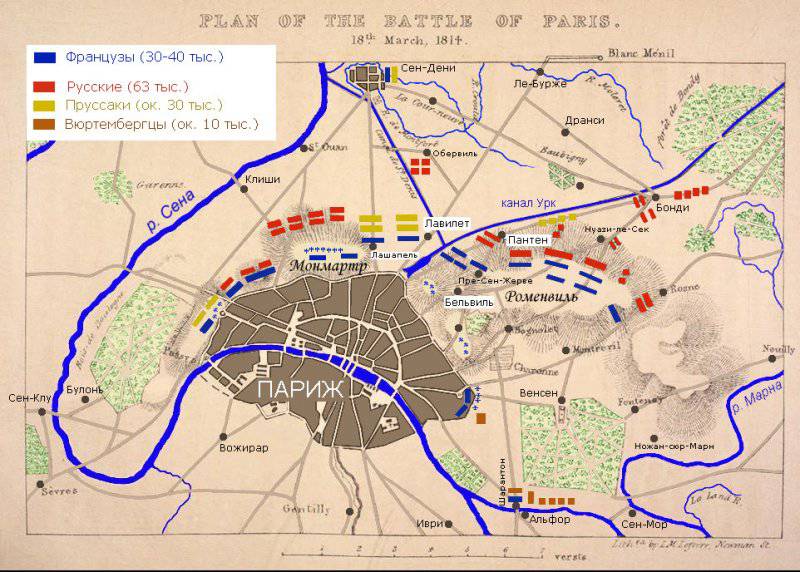
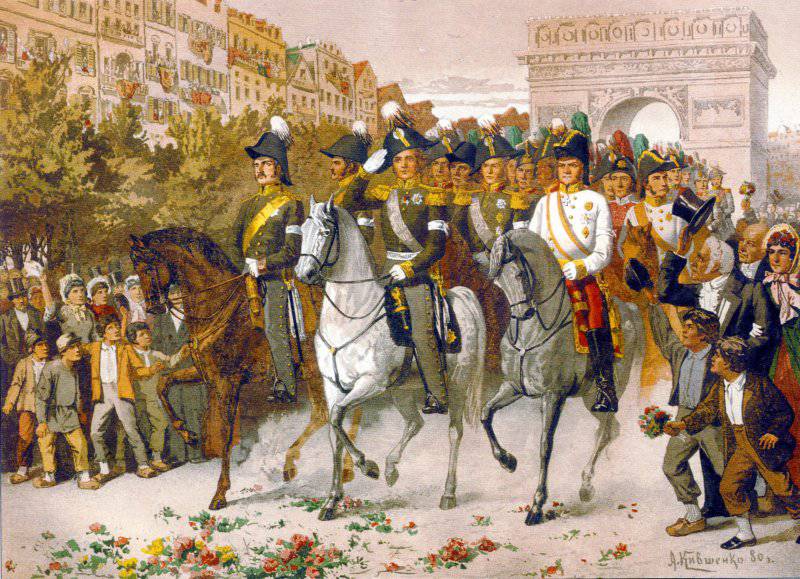
Information